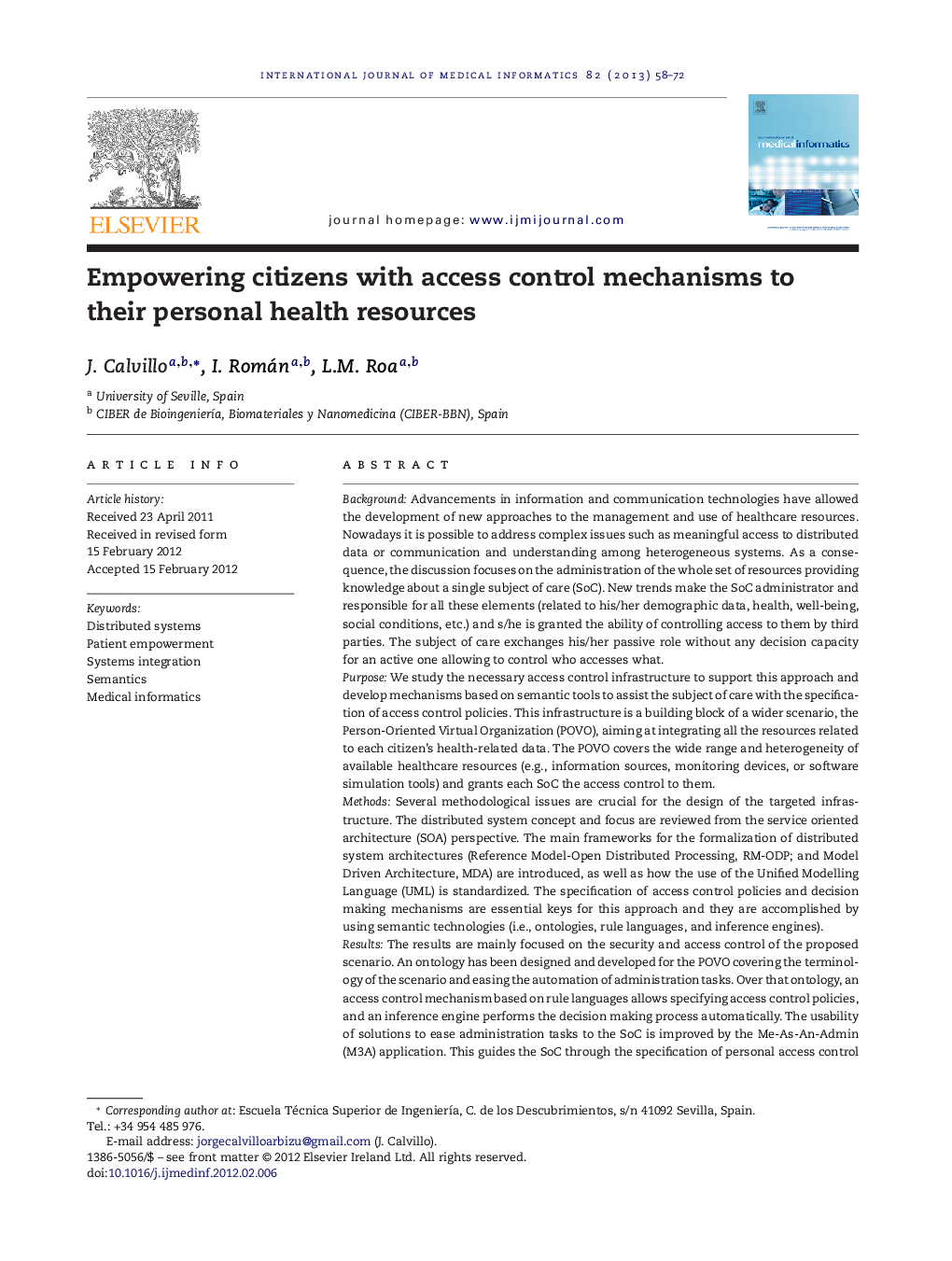| کد مقاله | کد نشریه | سال انتشار | مقاله انگلیسی | نسخه تمام متن |
|---|---|---|---|---|
| 516579 | 1449139 | 2013 | 15 صفحه PDF | دانلود رایگان |

BackgroundAdvancements in information and communication technologies have allowed the development of new approaches to the management and use of healthcare resources. Nowadays it is possible to address complex issues such as meaningful access to distributed data or communication and understanding among heterogeneous systems. As a consequence, the discussion focuses on the administration of the whole set of resources providing knowledge about a single subject of care (SoC). New trends make the SoC administrator and responsible for all these elements (related to his/her demographic data, health, well-being, social conditions, etc.) and s/he is granted the ability of controlling access to them by third parties. The subject of care exchanges his/her passive role without any decision capacity for an active one allowing to control who accesses what.PurposeWe study the necessary access control infrastructure to support this approach and develop mechanisms based on semantic tools to assist the subject of care with the specification of access control policies. This infrastructure is a building block of a wider scenario, the Person-Oriented Virtual Organization (POVO), aiming at integrating all the resources related to each citizen's health-related data. The POVO covers the wide range and heterogeneity of available healthcare resources (e.g., information sources, monitoring devices, or software simulation tools) and grants each SoC the access control to them.MethodsSeveral methodological issues are crucial for the design of the targeted infrastructure. The distributed system concept and focus are reviewed from the service oriented architecture (SOA) perspective. The main frameworks for the formalization of distributed system architectures (Reference Model-Open Distributed Processing, RM-ODP; and Model Driven Architecture, MDA) are introduced, as well as how the use of the Unified Modelling Language (UML) is standardized. The specification of access control policies and decision making mechanisms are essential keys for this approach and they are accomplished by using semantic technologies (i.e., ontologies, rule languages, and inference engines).ResultsThe results are mainly focused on the security and access control of the proposed scenario. An ontology has been designed and developed for the POVO covering the terminology of the scenario and easing the automation of administration tasks. Over that ontology, an access control mechanism based on rule languages allows specifying access control policies, and an inference engine performs the decision making process automatically. The usability of solutions to ease administration tasks to the SoC is improved by the Me-As-An-Admin (M3A) application. This guides the SoC through the specification of personal access control policies to his/her distributed resources by using semantic technologies (e.g., metamodeling, model-to-text transformations, etc.). All results are developed as services and included in an architecture in accordance with standards and principles of openness and interoperability.ConclusionsCurrent technology can bring health, social and well-being care actually centered on citizens, and granting each person the management of his/her health information. However, the application of technology without adopting methodologies or normalized guidelines will reduce the interoperability of solutions developed, failing in the development of advanced services and improved scenarios for health delivery. Standards and reference architectures can be cornerstones for future-proof and powerful developments. Finally, not only technology must follow citizen-centric approaches, but also the gaps needing legislative efforts that support these new paradigms of healthcare delivery must be identified and addressed.
► Promotion of a citizen-centred paradigm based on standards and a reference architecture.
► Person-Oriented Virtual Organization scenario joining resources related to a citizen.
► Usability as asset to promote the active role of subject of care.
► Subject of care empowered to friendly administration of his/her health resources.
Journal: International Journal of Medical Informatics - Volume 82, Issue 1, January 2013, Pages 58–72